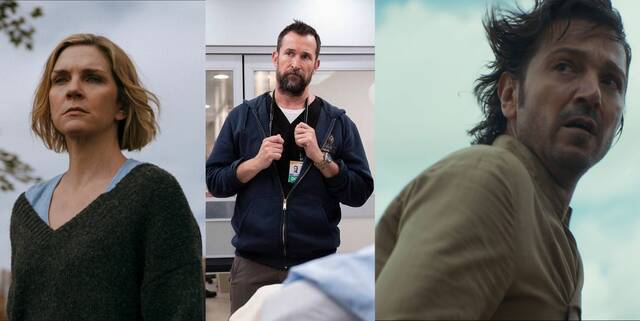At age 9, Anton Greene of Ann Arbor, Mich., thought it would be a lark to audition for a part in a film being made in Ukraine, his mother’s homeland.
“I didn’t have any acting experience. I just thought it would be fun to try out,” said Greene, now 19 and entering his sophomore year at the University of Michigan.
His mother, who came to the United States in 1998 and is now on the U of M faculty, heard about the audition through a Ukrainian friend living in Canada.
The film was “The Guide,” about an American boy visiting Ukraine who becomes a guide to a blind minstrel amid Soviet efforts to exterminate millions of Ukrainians during the 1930s.
Though the filmmakers originally wanted a young teen actor for the role of Peter, they thought Greene fit the bill. He was fluent in Ukrainian, having spent summers with relatives there from age 2 until the pandemic.
Filmed in 2012 and released in 2014, “The Guide” was selected as the Ukrainian entry for Best Foreign Language Film at the 87th Academy Awards – but was not nominated.
In fact, it was never shown in the United States until March, when it began traveling the country for screenings to benefit the Stand With Ukraine Through Film project.
“The Guide” will show at 4:35 p.m. Wednesday at Row House Cinema in Pittsburgh’s Lawrenceville section.
“The film is incredibly relevant to what’s going on now,” Greene said. “It’s always the same thing. The Russians, the Soviet Union, have always been attacking Ukrainians and their culture.”
The story takes place during the early 1930s, as Soviet dictator Josef Stalin sought to replace Ukraine’s small farms with state-run collectives and to punish Ukrainians who resisted the Soviet takeover of their hand. The resulting famine, known as the Holodomor, is estimated to have claimed the lives of about 4 million people.
During that time, minstrels traveled the country, singing traditional songs as a way to keep Ukrainian history and culture alive.
“Stalin wanted to liquidate the minstrels, and it’s the exact same thing today with the bombing of the cities and the historical sites,” Greene said. “What people don’t know is that they’re watching history repeat itself.”
Stand With Ukraine Through Film was organized by Marshall Strauss of Salem, Mass., a longtime activist and humanitarian who was looking for a way to help the people of Ukraine.
He and his wife, Elaine Gerdine, are owners of Cinema Salem, an independent three-screen movie theater in Salem. A film benefit seemed like a natural way to go.
Making a difference
“Go back to late February, and everybody wanted to help Ukraine,” Strauss said. “I had the same reaction. My wife and I happened to own a cinema. We recognized, at a minimum, we could create a community event where people would come together and we could raise some money for humanitarian aid.
“In our own small way we would make a difference,” he said.
Strauss thought it was only right to show a Ukrainian film.
“I hadn’t seen any Ukrainian films but was aware they existed,” he said. “It’s small by global standards, but there’s a high-quality film sector in Ukraine.”
A Columbia University faculty member put Strauss in touch with Oles Sanin, director of “The Guide.” Strauss told Sanin that all proceeds from a screening would go directly to relief efforts for the people of Ukraine.
“The director and everybody else in Kyiv were desperate for any kind of support, whether it was symbolic or actual,” Strauss said. “I asked if we could share (the film) with other theaters under the same arrangement. He said absolutely. The project grew in size stunningly quickly.”
Film industry contacts in Los Angeles helped with the distribution of “The Guide,” which now has screened across the United States and abroad.
“Within two weeks, over 600 cinemas across the U.S. and Canada, Australia and Holland all stepped forward and said they’d play the film,” Strauss said. “There are no contracts, no legalism. It’s all done by handshake.
“Everybody who takes the film agrees that all money they generate goes to Ukrainian relief,” he said.
So far, screenings across the country have raised more than $130,000. Though he doesn’t have figures from other countries, Strauss said he believes screenings elsewhere have “raised the equivalent of tens of thousands of dollars more.”
“We figured out a chain of nonprofit organizations that we could work through that would get the money into Ukraine into the hands of people who know how to spend it for the desired purposes,” Strauss said.
Among those organizations are World Central Kitchen; the International Organization on Migration, an agency of the United Nations; the Ukrainian Studies Fund, which supports lawyers and human rights activists; and Plast, a Ukrainian scouting organization.
Though he enjoyed his film-making experience, Greene wasn’t bitten by the acting bug. At U of M, he is double-majoring in political science and jazz saxophone.
“It’s not really my thing, and I wasn’t necessarily taking it extremely seriously,” he said. “It was a great experience because it took me back to the world of the 1930s. I didn’t know much about the brutal history of these blind minstrels.”
Greene also is grateful for any relief efforts for Ukraine, where many of his relatives remain. His grandmother was visiting in Ann Arbor when the war started and has remained there, and two young cousins also have made their way to stay with his family.
“Most of my relatives are in Lviv and are relatively safe right now, as far as living in Ukraine goes,” he said. “I have an uncle who is a member of Parliament. Another uncle is fighting in the east, and we haven’t heard from him in a while.”
All ticket sales from the Row House screening will go directly to Stand With Ukraine Through Film. Donations will be accepted through QR codes, which will be placed in their lobby for movie-goers to scan.
For information on the project, visit standwithukrainethroughfilm.org. For information on the Row House screening, visit rowhousecinema.com.












